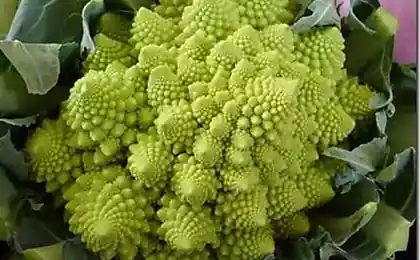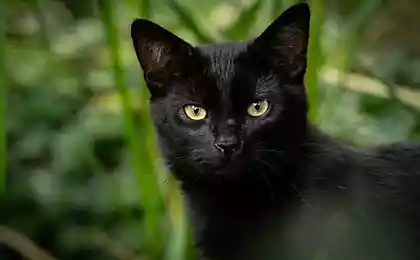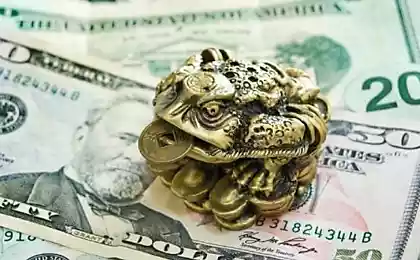7079
Ten interesting facts about kinship surrounding flora and fauna (10 photos)
Nowadays, thanks to the Internet, a lot of people can get a huge amount of knowledge, including the wildlife around us. And it turns out that, for example, a simple potato and sweet potato - it's completely different species, and a Great Dane and English Shepherd - is one and the same form. I offer you ten interesting facts about kinship surrounding flora and fauna.
Cabbage (Brassica oleracea)
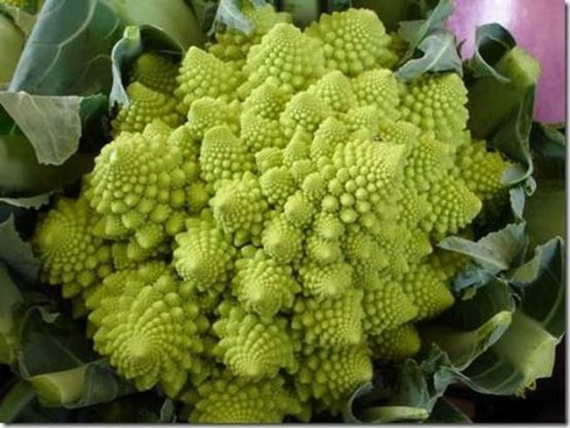
Cabbage, which is scientifically called Brassica oleracea, known to us as the juicy-leaved plants, which can be presented in different forms. Breeders brought several different cabbage species, each of which has its original flavor and appearance. Steamed broccoli, roasted cauliflower, pickled cabbage, brussels sprouts - it's all the same kind of cabbage. Broccoli was bred to "enhance" the central part (the stem), while a simple cabbage emphasis on the sheet portion. Brussels sprouts actually a miniature replica of cabbage and cauliflower - a paler version of broccoli.
Turnip (Brassica raps)
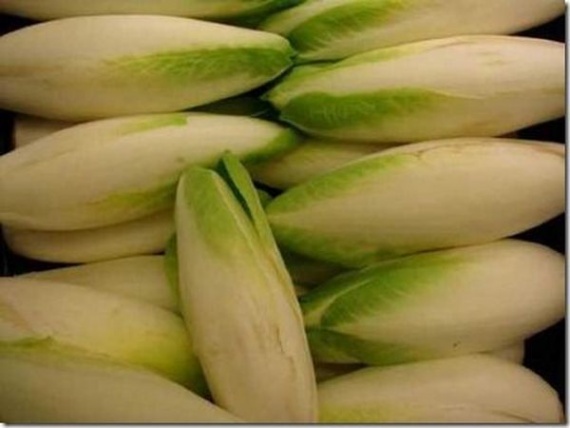
In traditional European cuisine dishes turnips are quite common, and in Asia for the preparation of these dishes used vegetable called boo chou. It turns out that these two seemingly unrelated ingredients are just different parts of the same plant - turnip. In the West, more cultivated underground part of the plant, it also goes into the food, and the East emphasis on aerial parts, leaves (remember the tale of the tops and roots?) If you list the main varieties of Brassica raps (scientific name turnip), we get the following list:
brokoletti
Japanese mustard
bak choi
chou sum
Napa cabbage
wombok
pechay
Pekinesis cabbage
and so on ...
Despite the different names and different appearance, they are one and the same plant - turnip.
Peppers (Capsicum annuum)
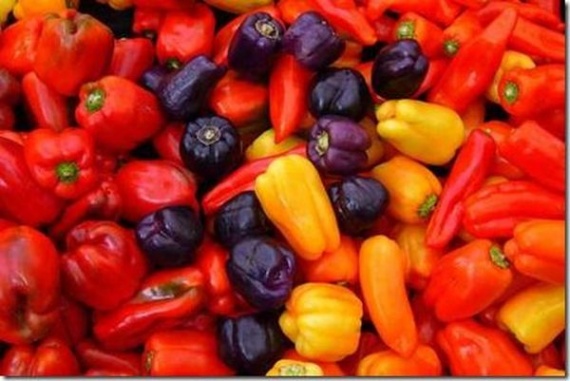
The most famous and favorite kind of this plant is sweet or bell pepper. It can be red, green, yellow, orange, and white color even foletovogo. In fact, all this abundance of colorful represents a different stage of maturity of one kind of pepper - vegetable. Immature green pepper, during ripening it becomes yellow and finally red. The white color is achieved by selecting the most pale copies, and purple launched specifically, but still all these peppers are one species - Capsicum annuum. In addition, some varieties of hot pepper that you can buy in the store are also varieties of this vegetable pepper. In German and Hebrew to refer to all of these aspectual vpertsa one word - paprika. In English and Russian paprika seasoning is used to indicate which is obtained by drying and grinding of pepper vegetable, so it's no coincidence nazyanie.
Pumpkin (Cucurbita pepo)
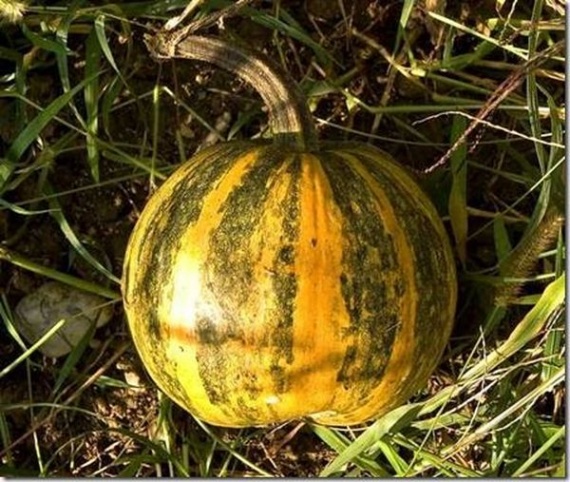
In Europe, cultured small cylindrical shape zucchini called zucchini (Zucchini), which have a white fluffy pulp after cooking and have a bitter taste and a mild buttery consistence. But if you take, for example, pumpkin, then color it may be from orange to green, the flesh is denser, larger seeds and solid, and the taste is totally different from zucchini. It would seem that they have in common? It turns out that it is one and the same form - Cucurbita pepo. By zucchini and pumpkin can add the scallops and zucchini. With significant external and taste the difference is a plant of the same species.
Tea plant (Camellia sinensis)
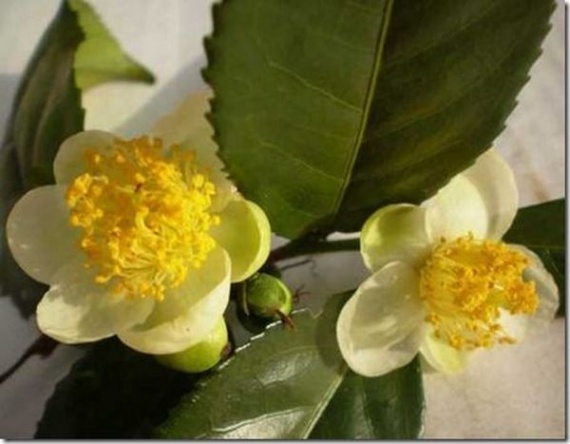
As you know, there are so many varieties of tea, which are distinguished by their taste and aroma. The composition of tea blends may include dried plants, fruit pieces, but the main component is still the tea leaves. Black tea, green tea, white tea, oolong tea - it's only a few large groups of teas, which are distinguished by their taste and color. All these teas are made on the basis of one plant - the tea plant Camellia sinensis. Its leaves are dried and fermented, the conditions and duration of which depends on how tea is obtained as a result. Green and white tea are the minimum fermentation after them is oolong, and thus the most fermented tea is black tea.
Mushroom (Agaricus bisporus)
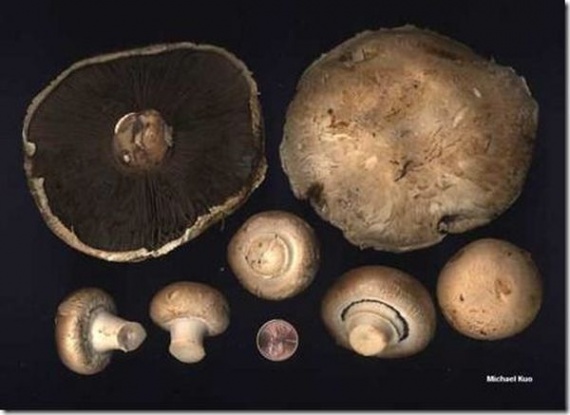
Mushrooms are a favorite dish of many of us. One of the safest ways to eat them - to buy in the store. And the most common, if not the only variety of fungi, which is sold in stores are mushrooms. These fungi are the most widespread, and sold around the world in huge quantities. There are many types of mushrooms - bald, large portobello (brown), tiny French, Swiss (brown) and a number of others that are not so common in our supermarkets. Such diversity is not achieved mushroom growing different varieties and taking pictures at different stages of growth (the same as in the case of paprika). First mushrooms are small and pale, as you grow, they become more flat, wide and dark. The name of them depends largely on the place where the mushrooms are grown (or grown initially).
Wolf (Canis lupus)
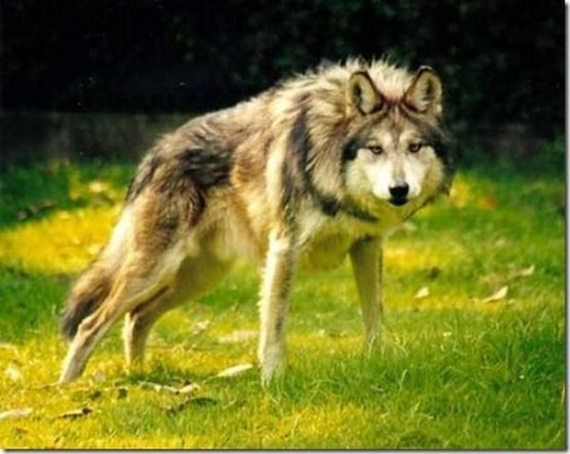
In nature, there are several views of the wolf (gray, Eurasian, Arabic, ginger, etc.), which, as you might guess, belong to the same species - Canis lupus. Still belongs to this kind of (surprise!) An ordinary pet dog. Any breed, any size - from lapdogs to St. Bernard - it's all the same Canis lupus. Dogs "separated" rather people were separated from wolves thousands of years ago, and degenerated into a different breed in zasisimosti the needs of the people to tame them. There is fighting, hunting, decorative and even meat breeds of dogs. No other animal species not represented in such a variety, like dogs.
Bear (Ursus arctos)
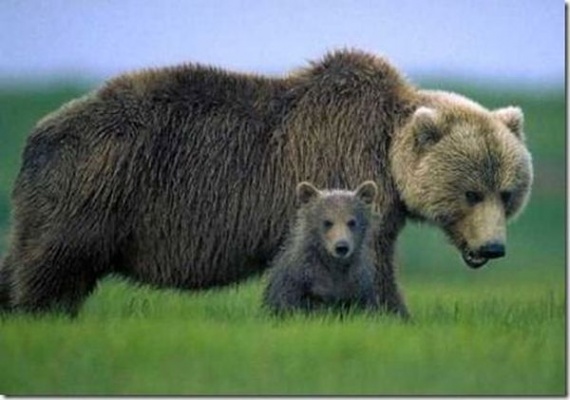
Bears - the largest land predators. Kodiak (the largest of the bears) Grizzly (also larger and more well-known predator), brown, black American, tibbetsky blue - it bears, it's all Ursus arctos. In general, the scientific name of the bear itself is unusual, it is from the Latin word Arctos, associated with Ursa Major (Big Dipper) and the Greek word for "bear". Bears can be short-haired, long-haired, brown, black, pale and tanned, while remaining one kind, while the differences between them can be so strong that biologists do not know exactly how many there are varieties of these formidable animals.
The horse (Equus ferus)
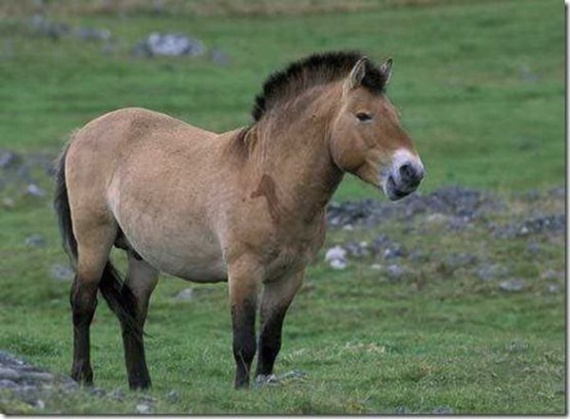
Wild horses, mustangs, or, apparently quite different from domestic horses, but it is the same species that descended from domesticated horses. The only truly wild horses - is the Przewalski horse, or Mongolian horses, which are other views. The rest of the horses differ only in their use of "at home", and can be tributary, decorative, dwarf and other remaining essentially Equus ferus.
Black Panther (Black Panther)

Black Panther stands out in this list because it is not one, but several kinds of cats. Called "black panther" can hide leopard, jaguar or puma, who lost the gene responsible for the production of melanin, which is why have a deep black coat color. A female jaguar spotted with normal coloration may be born two cubs, one of which bydet as "normal" spotty, and the second will be completely black. "Wrong" young leopard and jaguar may also be a little spotty, but these spots are almost invisible against the black wool - so are born black panthers. There is information about the birth of a black panther in the female tiger cub being born completely white (albino), and eventually replaced the color to black. It happened in one of the Indian zooparkov.Istochnik:
Cabbage (Brassica oleracea)

Cabbage, which is scientifically called Brassica oleracea, known to us as the juicy-leaved plants, which can be presented in different forms. Breeders brought several different cabbage species, each of which has its original flavor and appearance. Steamed broccoli, roasted cauliflower, pickled cabbage, brussels sprouts - it's all the same kind of cabbage. Broccoli was bred to "enhance" the central part (the stem), while a simple cabbage emphasis on the sheet portion. Brussels sprouts actually a miniature replica of cabbage and cauliflower - a paler version of broccoli.
Turnip (Brassica raps)

In traditional European cuisine dishes turnips are quite common, and in Asia for the preparation of these dishes used vegetable called boo chou. It turns out that these two seemingly unrelated ingredients are just different parts of the same plant - turnip. In the West, more cultivated underground part of the plant, it also goes into the food, and the East emphasis on aerial parts, leaves (remember the tale of the tops and roots?) If you list the main varieties of Brassica raps (scientific name turnip), we get the following list:
brokoletti
Japanese mustard
bak choi
chou sum
Napa cabbage
wombok
pechay
Pekinesis cabbage
and so on ...
Despite the different names and different appearance, they are one and the same plant - turnip.
Peppers (Capsicum annuum)

The most famous and favorite kind of this plant is sweet or bell pepper. It can be red, green, yellow, orange, and white color even foletovogo. In fact, all this abundance of colorful represents a different stage of maturity of one kind of pepper - vegetable. Immature green pepper, during ripening it becomes yellow and finally red. The white color is achieved by selecting the most pale copies, and purple launched specifically, but still all these peppers are one species - Capsicum annuum. In addition, some varieties of hot pepper that you can buy in the store are also varieties of this vegetable pepper. In German and Hebrew to refer to all of these aspectual vpertsa one word - paprika. In English and Russian paprika seasoning is used to indicate which is obtained by drying and grinding of pepper vegetable, so it's no coincidence nazyanie.
Pumpkin (Cucurbita pepo)

In Europe, cultured small cylindrical shape zucchini called zucchini (Zucchini), which have a white fluffy pulp after cooking and have a bitter taste and a mild buttery consistence. But if you take, for example, pumpkin, then color it may be from orange to green, the flesh is denser, larger seeds and solid, and the taste is totally different from zucchini. It would seem that they have in common? It turns out that it is one and the same form - Cucurbita pepo. By zucchini and pumpkin can add the scallops and zucchini. With significant external and taste the difference is a plant of the same species.
Tea plant (Camellia sinensis)

As you know, there are so many varieties of tea, which are distinguished by their taste and aroma. The composition of tea blends may include dried plants, fruit pieces, but the main component is still the tea leaves. Black tea, green tea, white tea, oolong tea - it's only a few large groups of teas, which are distinguished by their taste and color. All these teas are made on the basis of one plant - the tea plant Camellia sinensis. Its leaves are dried and fermented, the conditions and duration of which depends on how tea is obtained as a result. Green and white tea are the minimum fermentation after them is oolong, and thus the most fermented tea is black tea.
Mushroom (Agaricus bisporus)

Mushrooms are a favorite dish of many of us. One of the safest ways to eat them - to buy in the store. And the most common, if not the only variety of fungi, which is sold in stores are mushrooms. These fungi are the most widespread, and sold around the world in huge quantities. There are many types of mushrooms - bald, large portobello (brown), tiny French, Swiss (brown) and a number of others that are not so common in our supermarkets. Such diversity is not achieved mushroom growing different varieties and taking pictures at different stages of growth (the same as in the case of paprika). First mushrooms are small and pale, as you grow, they become more flat, wide and dark. The name of them depends largely on the place where the mushrooms are grown (or grown initially).
Wolf (Canis lupus)

In nature, there are several views of the wolf (gray, Eurasian, Arabic, ginger, etc.), which, as you might guess, belong to the same species - Canis lupus. Still belongs to this kind of (surprise!) An ordinary pet dog. Any breed, any size - from lapdogs to St. Bernard - it's all the same Canis lupus. Dogs "separated" rather people were separated from wolves thousands of years ago, and degenerated into a different breed in zasisimosti the needs of the people to tame them. There is fighting, hunting, decorative and even meat breeds of dogs. No other animal species not represented in such a variety, like dogs.
Bear (Ursus arctos)

Bears - the largest land predators. Kodiak (the largest of the bears) Grizzly (also larger and more well-known predator), brown, black American, tibbetsky blue - it bears, it's all Ursus arctos. In general, the scientific name of the bear itself is unusual, it is from the Latin word Arctos, associated with Ursa Major (Big Dipper) and the Greek word for "bear". Bears can be short-haired, long-haired, brown, black, pale and tanned, while remaining one kind, while the differences between them can be so strong that biologists do not know exactly how many there are varieties of these formidable animals.
The horse (Equus ferus)

Wild horses, mustangs, or, apparently quite different from domestic horses, but it is the same species that descended from domesticated horses. The only truly wild horses - is the Przewalski horse, or Mongolian horses, which are other views. The rest of the horses differ only in their use of "at home", and can be tributary, decorative, dwarf and other remaining essentially Equus ferus.
Black Panther (Black Panther)

Black Panther stands out in this list because it is not one, but several kinds of cats. Called "black panther" can hide leopard, jaguar or puma, who lost the gene responsible for the production of melanin, which is why have a deep black coat color. A female jaguar spotted with normal coloration may be born two cubs, one of which bydet as "normal" spotty, and the second will be completely black. "Wrong" young leopard and jaguar may also be a little spotty, but these spots are almost invisible against the black wool - so are born black panthers. There is information about the birth of a black panther in the female tiger cub being born completely white (albino), and eventually replaced the color to black. It happened in one of the Indian zooparkov.Istochnik:
5 trick that the brain keeps you in the power of the hated bad habit (5 photos)
40 interesting facts about tigers (4 photos)

